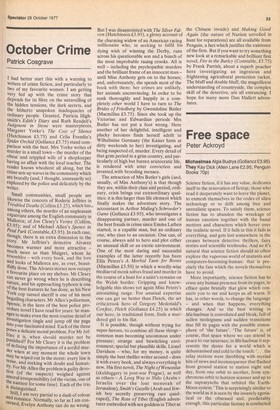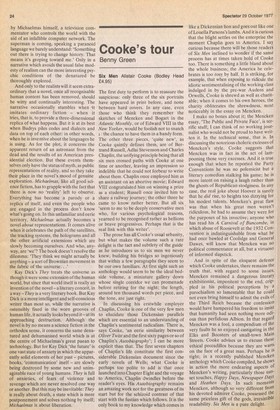Free space Peter Ackroyd Michaelmas Algis Budrys (Gollancz £3.95) They
Kay Dick (Men Lane £2.95; Penguin Books 70p) Science fiction, if it has any value, dedicates itself to the renovation of fictiop; those who read it desperately want to leave the planet, to enmesh themselves in the codes of alien technology or to drift among free and unrealistic spaces. To satisfy them, science fiction has to abandon the wreckage of human emotion together with the banal motives and characters which hover over the realistic novel. If it fails in this it fails in everything, and gets lost somewhere in the creases between detective thrillers, fairy stories and scientific textbooks. And so it's natural that science fiction should so often explore the vaporous world of mutants and computers-becoming-human: that is precisely the fate which the novels themselves have to avoid.
More importantly, science fiction has to erase any human presence from its pages, to efface quite brutally that glow which connects you to me and keeps us all warm. It has, in other words, to change the language — and when that happens, everything changes. And so the best writing in Michaelmas is convoluted and bleak, full of sullen neologisms and sudden transitions that fill its pages with the possible atmosphere of 'the future'. 'The future' is, of course, that space where we can attend in peace to our neuroses; in Michaelmas it represents the desire for a world which is dehumanised and cold to the touch: '. . . the relay stations were throbbing with myriad bits of news and inconsequence that flashed from ground station to station night and day, from one orbit to another, from synchronous orbit to horizon scanner and up to the suprasynchs that orbited the EarthMoon system.' This is surprisingly similar to the world as it is seen by the insanely egotistical or the obsessed and, predictably enough, this particular fantasy is conducted by Michaelmas himself, a television commentator who controls the world with the aid of an infallible computer network. The superman is coming, speaking a paranoid language we barely understand: 'Something Out there is trying to change history. That means it's groping toward me: Only in a narrative which avoids the usual false modesty of realism can the more interesting psychic conditions of the denatured be thoroughly explored.
And only to the realists will it seem extraordinary that a novel, once all recognisable human content has been removed, should be witty and continually interesting. The narrative occasionally stumbles when it imitates ordinary fiction — when it tries, that is, to provide a three-dimensional replica of what happens. But it is at its best when Budrys piles codes and dialects and data on top of each other: in other words, when he is inventive about the languages he is using. As for the plot, it concerns the apparent return of an astronaut from the dead and the results of an American presidential election. But these events themselves only have the status of myth, as public representations of reality, and so they take their place in the novel's mood of genuine exploration. Michaelmas, like all good science fiction, has to grapple with the fact that there is now no 'reality' left to observe. Everything has become a parody or a replica of itself, and even the people who are engaged in the process don't know what's going on. In this unfamiliar and eerie territory, Michaelmas actually becomes a novel about representations. It comes alive when it celebrates the path of the satellites, the tracking systems, the holograms and all the other artificial extensions which are slowly becoming ourselves. And who, anyway, are 'we'? The book doesn't resolve the dilemma: 'They think we might actually be anything — a sort of Brownian movement in the fabric of the universe. .
Kay Dick's They treats the universe as though it were some extension of the human world, but since that world itself is really an invention of the novel — a literary conceit, in a way— They is a very literary book. But Kay Dick is a more intelligent and self-conscious writer than most so, while the narrative is ostensibly fixed in the worn grooves of human life, it actually looks beyond it —at its approaching destruction. Although the novel is by no means a science fiction in the orthodox sense, it concerns the same denatured and dehumanised world which is at the centre of Michaelmas's great paean to technology. But for Kay Dick !the future' is one vast state of anxiety in which the apparently solid elements of her past — pictures, books, 'communication' itself — are slowly being destroyed by some new and unimaginable race of young humans. They is full of anxieties, of fears of violence and revenge which are never resolved one way or another. But this may be inevitable: They is really about death, a state which is mere postponement and solves nothing by itself; Michaelmas is about liberation.



































 Previous page
Previous page